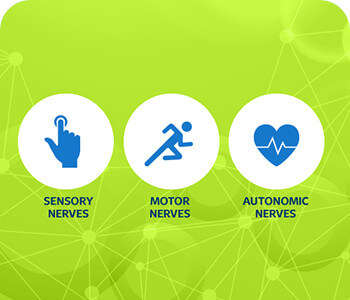Some signs may be misleading, always talk to your doctor
Many of the common symptoms of nerve impairment are often dismissed as something perhaps related to advancing age and therefore are ignored. The disease behind these nerve impairments and related discomforts is called peripheral neuropathy.
What appears to be an innocuous sign, often dismissed as “nothing too important”, could be the sign that something might happen to your nerves. Sometimes it’s just a matter of stopping for a moment and paying attention to the signals of the body.
Ignoring symptoms and self-diagnosis without a medical supervision are two wrong approaches for your healthcare.
Symptoms can be the expression of many and different diseases and when it comes to nerves the right interpretation can be very hard.
Dizziness and numbness are two commonly known discomforts. Not everybody knows though that these can be symptoms of peripheral neuropathy and that they can have numerous causes.
DIZZINESS: a symptom of nerve impairment?

Dizziness, for example, is that feeling of being lightheaded, woozy or unbalanced.
You might feel it when you’re very tired or if you suffer of migraine, but did you know that it could also be the symptom of an ear infection or possibly nerve damage?
That’s why telling to your doctor what you experience and not fully understand is so important.
NUMBNESS: a symptom of nerve impairment?

Numbness, that sensation of wearing an invisible “glove” or “sock” that impedes you to feel touch, is another example of symptom of nerve impairment that can be linked to other disorders. Numb feelings in feet and hands are often associated with blood flow too. You’d easily think it’s an issue with blood circulation… not necessarily!
Whatever is the sensation you feel or think you have, tell your doctor about it, because numbness sensation can stop you from feeling pain and injuries. A small cut in the feet, or a stone in the shoe can cause a lesion, which - when unobserved - can lead to an infection. This is common in diabetic patients and is called “diabetic foot syndrome”.
WALKING DIFFICULTIES: a symptom of nerve impairment?

Why do some elderly people have walking difficulties and appear stiff and un-flexible? Is this always due to joint issues?
It’s important to know that walking difficulties are not necessarily due to stiff joints or associated sicknesses. In fact, “foot drop” can also be a symptom of peripheral neuropathy. People with neuropathy can have numbness in their feet, do not feel the ground, might have muscle weakness additionally and are unable to lift the toes clear of the ground, which makes their gait unstable, walking and coordination difficult.
Whatever disease you think you have, explain to your doctor all your symptoms so that he can give you a complete diagnosis.
MUSCLE CRAMPS: a symptom of nerve impairment?

Everybody knows muscle cramps. They can have different causes and sometimes just disappear as they appeared. However, in some cases, a medical condition can cause muscle cramps. If your muscle cramps are severe, don’t improve with stretching, or persist for a long time, it could be a sign of an underlying disease. Let your doctor know if you’re experiencing for example weakness, burning pain or a loss of sensation. These, but also other symptoms, can be signs of a nerve disorder.





